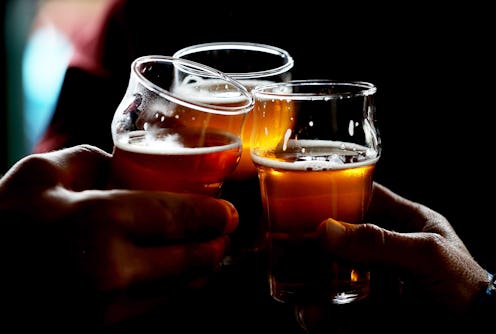Most of us love to get our drink on, but it seems that unhealthy alcohol behaviors are a very common problem in our society and probably more prevalent than many of us thought. A new study published in the journal of JAMA Psychiatry found that almost 30 percent of Americans have had an alcohol problem in their lives. And if that doesn't convince you that it's a problem we need to treat sensitively and effictively, I don't know what will.
This number is alarming, but the reason it hasn't been cited sooner is because of changes to the American Psychiatric Association's definition of Alcohol Use Disorder. The definition was revised in the fifth edition of the Diagnostic and Statistical Manual of Mental Disorders (the DSM) to include 11 possible pieces of criteria for diagnosis.Those participating in the third National Epidemiological Survey on Alcohol and Related Conditions, which conducted over 36,000 interviews over the course of 2012 and 2013, had to meet at least two of those 11 pieces of criteria in order to be diagnosed with an alcohol use disorder.
The researchers also found that binge drinking is on the rise — and, indeed, that it's becoming the new norm in alcohol consumption. Dr. George Koob from the National Institute on Alcohol Abuse and Alcoholism confirms this finding in his own work, telling Newsweek, “There has been this cultural shift — people are drinking more when they drink."
The study also found some disturbing information when it comes to seeking help and support for an alcohol problem. Only 20 percent of those with an alcohol use disorder sought treatment; furthermore, for those diagnosed this past year, that figure falls to only eight percent. Dr. Koob commented on this, saying that the stigma associated with alcohol-related disorders is powerful and therefore probably keeping people from seeking the help they need.
In terms of demographics, those who are young and unmarried have a higher rate of alcohol abuse than those who are older and married, the study found. Men were also more effected by alcohol use disorder than women; additionally, almost half of Native Americans have been effected in their lifetimes. Those who have other mental illnesses like bipolar disorder, anti-social behavioral, or borderline personality disorders are also more likely to have AUD than others.
If you're wondering what the difference between alcohol use disorder and alcoholism are, the latter term doesn't have an official medical definition. Alcohol Use Disorder is an umbrella term that encompasses a wider variety of behaviors than alcoholism, which itself falls somewhere in the moderate to severe range of the spectrum. “There are various degrees of this disorder.... It could be somebody who’s gotten several DUIs. It could be that you just wake up hungover a lot," Dr. Koob told Newsweek.
The studies conclusion emphasizes the importance of these findings and the need for the medical community to take action. "The... data indicate an urgent need to educate the public and policy makers about AUD and its treatment alternatives," the studies authors wrote. They also said that we need to collectively make efforts to decrease the stigma associated with the disorder and encourage others to seek help when appropriate. The Center for Disease Control Found that this problem is costing our society $224 billion dollars per year, making this a social problem we can't afford to ignore- literally.
Images: Giphy; Getty Images
